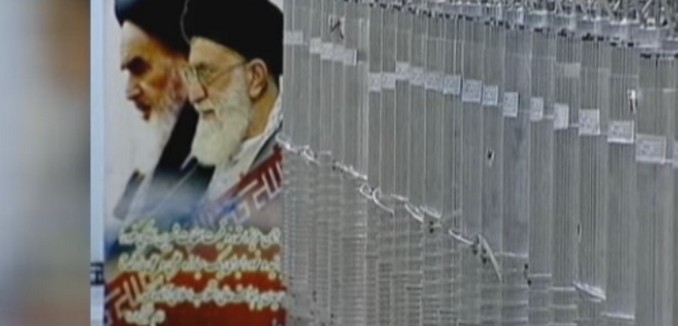Iran is believed to be secretly building advanced centrifuges that would greatly shorten its breakout time to a nuclear weapon, Adam Kredo reported Monday for the Washington Free Beacon.
Ali Akbar Salehi, head of the Atomic Energy Organization of Iran, indicated in early April that Iran could mass-produce advanced centrifuges and would do so if the U.S. violates the 2015 nuclear deal.
David Albright, a former weapons inspector and president of the Institute for Science and International Security, and Olli Heinonen, a former deputy director general of the International Atomic Energy Agency (IAEA), argued in a recent paper that Salehi’s remarks require “careful scrutiny.” If true, the IAEA needs to know how many advanced centrifuges Iran has or, alternatively, the full inventory of parts it has for advanced centrifuges.
The nuclear deal limits Iran to possessing tens of advanced centrifuges, meaning that mass-production of the devices would violate the accord.
“Iran could have already stockpiled many advanced centrifuge components, associated raw materials, and the equipment necessary to operate a large number of advanced centrifuges,” Albright and Heinonen wrote. “The United States and the International Atomic Energy Agency (IAEA) need to determine the status of Iran’s centrifuge manufacturing capabilities, including the number of key centrifuge parts Iran has made and the amount of centrifuge equipment it has procured.”
The problem with ascertaining the veracity of Salehi’s comments and assembling a complete inventory of Iran’s centrifuges and centrifuge components “is complicated by the lack of access international nuclear inspectors have to Iran’s contested military sites,” Kredo wrote, citing the report.
Salehi’s comments suggest that Iran is preparing to expand its centrifuge program beyond the limits set down in the agreement. The IAEA’s inability to verify his claims points to “significant weaknesses in the Iran deal that need to be fixed,” Albright and Heinonen observed.
“Under the JCPOA, consistent with Iran’s enrichment and enrichment and [research and development] plan, Iran can only engage in production of centrifuges, including centrifuge rotors and associated components, to meet the enrichment and R&D requirements of the JCPOA,” a State Department official told Kredo. “In other words, Iran’s production of centrifuges and associated components are limited to be consistent with the small scale of R&D that is permissible under the JCPOA.”
The official also said that the administration is reviewing Iran’s nuclear program and that the Islamic Republic will be “held strictly accountable to its requirements.”
The heightened concerns over Iran’s uranium enrichment program follows the publication of an IAEA report showing that Iran is on the verge of violating the cap on its heavy water stockpiles for the third time.
Reuters reported Friday that Iran’s stockpile of heavy water, which can be used to produce weapons-grade plutonium, “reached 128.2 tonnes, just below a 130-tonne limit,” according the IAEA.
In April and November 2016, Iran was found to be in violation of the 130-ton cap on heavy water imposed by the nuclear deal.
[Photo: euronews (in English) / YouTube ]




